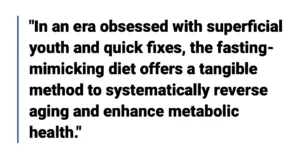(Fox News) Could adopting a fasting-like diet help slow down aging?
That’s the claim of researchers from the USC Leonard Davis School of Gerontology in Los Angeles, who led a study on the benefits of a “fasting-mimicking diet” (FMD).
In addition to reducing biological age and immune system aging, the diet was linked to reductions in insulin resistance and liver fat, according to a press release from the university.
The findings, published in Nature Communications on Feb. 20, were based on clinical trials that included 100 men and women between 18 and 70 years old.
Half of the group was randomly assigned to the FMD, adhering to the diet for five days followed by 25 days of normal eating for three or four cycles.

A fasting-mimicking diet was found to reduce biological age and immune system aging, as well as insulin resistance and liver fat, in a new study. (iStock)
The control group ate either a normal diet or a Mediterranean-style diet.
The people in the FMD group showed decreased abdominal and liver fat, as well as reduced risk of metabolic syndrome, which can lead to heart disease, stroke and diabetes.
Those on the experimental diet also showed signs of a more youthful immune system.
Overall, the FMD adopters’ biological age was reduced by an average of 2.5 years based on the functioning of their cells and tissues, the researchers found.

In the USC study, the fasting-mimicking diet included energy bars, plant-based soups, chip snacks, energy drinks and tea.(iStock)
“I think it is surprising that three cycles of the FMD done for only five days a month (15 days total) — which allow people to have modified/low calorie but regular meals and without changing the normal diet of the participants for the rest of the month — can have such an effect on biological age, body fat and a range of disease risk factors,” senior author Valter Longo, USC Leonard Davis School Professor, told Fox News Digital.
If the cycles were continued for three cycles a year for 20 years, Longo projected that the FMD could reduce biological age by 11 years and reduce the risk of cancer, cardiovascular disease and diabetes by 10% to 30%.
“However, these are only simulations — and additional studies are necessary to confirm this potential of the FMD cycles,” he added.

Half of the group was randomly assigned to the FMD, adhering to the diet for five days followed by 25 days of normal eating for three or four cycles. (iStock)
Prior studies in mice have identified additional benefits of the FMD, including reduced risk of age-related diseases like cancer, heart disease and diabetes, Vongo pointed out.
The diet has been previously to reduced chemo side effects, greater stem cell regeneration and reduced signs of dementia, the release stated.
What is the fasting-mimicking diet?
Originally developed by Longo, the FMD is a five-day diet that is low in overall calories, protein and carbohydrates and high in unsaturated fat.
The eating plan is designed to mimic a pure fast while still allowing consumption of essential nutrients.
“The fasting-mimicking diet (FMD), also known as the ProLon Diet, has been around for approximately seven years and has been studied in multiple clinical trials,” Erin Palinski-Wade, a New Jersey-based registered dietitian, told Fox News Digital.
“By following a structured, very low-calorie nutrition plan for five days, the goal is to provide the benefits of a prolonged fast while still allowing individuals to eat,” said Palinski-Wade, who was not involved in the USC study.
“The diet is designed to transition the body into a fasting state while nourishing it with specific nutrients to avoid activating food-sensing pathways.”

“[The diet] allows for physical, biological and epigenetic benefits without the need for prolonged water-only fasts,” an expert said. (iStock)
In the USC study, the fasting-mimicking diet included energy bars, plant-based soups, chip snacks, energy drinks and tea, according to the release.
The FMD group also received a supplement with “high levels of minerals, vitamins and essential fatty acids.”
The specific diet that was tested in the two trials is commercially available, but Longo said that university rules prevent him from sharing the name of the product.

“I think it is important to begin to consider the plant-based FMD intervention described here for two to three times a year as a way to prevent and treat some diseases, together with the right type of drugs,” Longo said.
This could aid in “returning to full health and living longer and healthier, rather than continuing to take progressively more drugs as we age,” he added.
For people aiming to prevent or treat diseases through the use of an FMD, Longo said people should first talk to a doctor.
Other experts weigh in on the diet
Melanie Avalon, an Atlanta-based health influencer who hosts “The Intermittent Fasting Podcast,” was not involved in the study, but noted that the research provides “solid data” on how dietary and lifestyle changes affect the aging process.
“Our society’s fascination with youth and longevity is well-known; however, measuring progress and biological improvements is often subjective,” she told Fox News Digital.







